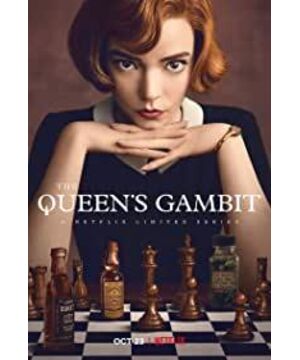"The Abandoned Soldier" is very nice! I finished seven episodes in one day and planned to read the original novel.
Then again, regret: the Soviet Union does not exist after all, and will not defend itself. Even if the heroine is a genius set by legendary American chess player Bobby Fischer, it is still too specific. The king of chess in that era was still the Soviets. I'm afraid the writers and screenwriters of the novel underestimate the systemic nature of chess as an intellectual sport. Just like the football world, all powerful countries have a youth training system. Brazil, Argentina, and African countries, which are regarded as constant geniuses because of street football, have experienced declining performance in recent years, which is obvious to all. Of course, football is a collective project, and it can be discussed how comparable it is with the chess game of individual projects.
In fact, Chinese people of my generation often know the names of several Soviet chess players: Karpov and Kasparov. We even know the names of three foreign female chess players: Ciburdani of the Soviet Union Ze, Jocheriani, and little Polgar from Hungary—in fact, we also know her two older sisters, especially Big Polgar. Yes, these are the names of the players who competed with Xie Jun for the chess queen at that time (see below for the reason why little Polgar is not among them). I remember that there were strong reports on chess in China at that time, not to mention the post-chess hegemony. You can also see the introduction of the game in the National Xiang Olympiad. I remember that the Chinese women's team won the world championship very early. Therefore, Zhu Chen and Qin Kanying are also familiar names, and we also know the first, second, and third stations - little Polgar is a female chess player and sits on the third station of the Hungarian men's team. . For me, this list can be extended to later Bu Xiangzhi and Hou Yifan. In addition, my neighbor downstairs won the title of International Master in high school and was recommended to go to Shanghai University of Finance and Economics. The university near my house is an institution of higher learning in Shanghai that recruits chess students specializing in chess, just like Xie Jun graduated from Beijing Normal University.
It is true that the propaganda of chess in my country at that time was also aimed at promoting the prestige of our country. The kind of situation in which thousands of people pay attention to Xie Jun, whether they know or not (most of them don't understand), and talk about Xie Jun's future of winning the championship. Probably only Zhang Yimou's movie will win the Golden Bear and Golden Lion Oscar.
The film still has a touch of anti-Soviet ideology-although the heroine refused to make an anti-Soviet statement by the Christian Crusaders under the threat of funding a Moscow match, and rejected the US State Department's request to emphasize in an interview that coming to the Soviet Union felt more alive Lucky private goods for Americans, but the little Soviet chess players yearn for American drive-in theaters (that is, American culture) (in turn, I think the heroine used this layer and deliberately walked around to show her posture to interfere with the little chess players), the Soviet Union It is unrealistic for the public to cheer for the American female chess player to beat their own country's chess player - although it can prove that the Soviet Union is unpopular, both the United States and the Soviet Union knew at that time that this was an opportunity to show the superiority of their own system, and the Soviet Union did not account for it. Downwind. Of course, several Soviet chess players in this film are either cute or respectable - but after all, they all lost to the heroine, and it is difficult not to think that the Soviet Union lost to the United States. Don't say that the United States doesn't care about this, the grievances of the men's basketball finals at the 1988 Seoul Olympics are proof.
This film also has the side of returning to the mainstream value: the heroine gradually returned to the right path after drinking heavily because of the concern of her friends, the former friend brought the news of her enlightenment teacher's death and returned to the orphanage, and heard the chant sung by the children— —Even the soundtrack to Mr. Sabé's basement later has that style. In the end, she ditched the sedatives and alcohol for an impeccable victory.
I personally think that the female protagonist may have a source other than Bobby Fischer, that is, the American pianist Van Cliburn, who won the gold medal in the Tchaikovsky piano competition held in Moscow in 1958, It also made the United States proud, and indeed after his award, the Soviet people chanted his name. But what needs to be explained is that, first, Van Cliburn was under the tutelage of the Levigne couple (who left Russia after the October Revolution); therefore, what the Soviet people heard from the American player’s performance was Authentic Russian school performance; secondly, two more outstanding students of the Soviet Union and Levigne’s colleague Negoz: Richter and Gilles, who applauded and cheered, in fact, to celebrate Russian culture output. If you think it's a protest against power grabbing, I can't help it either.
It is worth mentioning that, also in 1958, the Nobel Prize for Literature was awarded to the Soviet writer Pasternak. Do you think that there are no secret influences from the two camps? But Pasternak ultimately did not go to accept the award.
In fact, if you are playing the piano, it is not impossible to write, but the piano competition is more subjective, and there is no third party involved in the performance. At the end of the film, the heroine defeated her opponent under the advice of a good friend (without exception, not a defeated general). In fact, their analysis may not be useful, but this warm incentive cannot be ignored - this truth can be understood only by knowing the "tacit knowledge" of Karl Pollini. It is also at this point that American screenwriters once again show how to express the wisdom and skills of collective subjects on the basis of individualism: there is no leadership that is wise or tolerant or considerate, but makes people feel the power of temporary and spontaneous collectives. praise. The power of the collective is of course worthy of praise, but it should be temporary and spontaneous. This analysis somewhat borrows from Wang Haiming's speech on altruism.
The heroine's experience is legendary: she was born out of wedlock, became an orphan, grew up in an orphanage and was exposed to chess. On this road, the adoptive mother died when going abroad to compete, and the adoptive father took back the property after returning to China, but all of this did not overwhelm the heroine, saying that this is a coming-of-age novel with women's equal rights and affirming liberal values, there should be no problem; To say that this embodies the American Dream would be more or less the same. I even think that if there is no time barrier, Jane Eyre will lose its color, because orphans, orphanages, and women's understanding of themselves, all these contents correspond to each other, and this film handles sex very gently, free and not indulgence. Of course, as an old father, I still feel pity for the heroine's first time (but that guy is not so bad because he can read the Russian version of Dostoevsky's novels), and it is precisely this feeling. It's a pity that it made me realize the deep-rooted traditional culture in my body. On the contrary, the adoptive mother of the heroine (I checked, the actor is two years older than me) immediately understood her attitude when she received the phone call from her daughter telling her that she had brought her keys and did not need to leave the door. By the way, this adoptive mother gave her daughter a correct understanding that life is not just about playing chess. The heroine's alcoholism can be regarded as a real daughter in spirit.
Rao is the sexual content. This film is helpful for building female self-awareness and resisting peer pressure. When my daughter is old enough, I will show her.
There are several special details in this film that deeply moved me: the first is when the high school chess coach took a picture of himself and Mr. Sabé, the heroine took the initiative to put her hand on Mr. Sabé’s shoulder; the second was when she won 500 US dollar reward, the adoptive mother hesitated to ask herself if she could keep 10% as brokerage fee, the heroine said it would be 15%; the third is that when the heroine was asked to talk about the superiority of the American system, it was Mr. Sabei’s right. own teachings, and ask the newspaper to make sure it gets published.
I remembered that there is a Japanese animation called "Soul of Chess", which is said to have boosted the interest of Japanese people in Go, so what about this film? Is it encouraging American women to choose chess and science? Or reaffirm the ideology of liberty? Will there be a film in the future where the U.S. Olympic math team defeats the Chinese Olympic math team? No, although most of them are of Chinese descent, given the embarrassing status of Chinese men and the fact that there is also a training team, the institutional advantages are not obvious.
The amazing thing about this film is that although it can be interpreted as a struggle for the system, and it can be interpreted as a fight for liberalism (a booster), it can also be interpreted as a battle between generations, and it can also be interpreted as a fight for young people.
I'm very, very optimistic about the actress's star road, and the post-95s have excellent acting skills.
Fang Wei has a novel "The Tongue Hunter", which is about the confrontation between two Chinese and Japanese chefs during the Anti-Japanese War, and involves concepts; Bi Feiyu has a novel "Chu Shui", which also discusses the two cultures through a game of chess between China and Japan during the Anti-Japanese War. differences, are recommended together.
View more about The Queen's Gambit reviews











